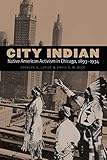City Indian : Native American activism in Chicago, 1893-1934 / Rosalyn R. LaPier and David R.M. Beck.
Material type: TextPublication details: Lincoln, NB : University of Nebraska Press, (c)2015.Description: 1 online resourceContent type:
TextPublication details: Lincoln, NB : University of Nebraska Press, (c)2015.Description: 1 online resourceContent type: - text
- computer
- online resource
- 9780803278509
- 9780803278486
- White people -- Illinois -- Chicago -- Relations with Indians
- Indian activists -- Illinois -- Chicago -- Biography
- Urban Indians -- North America
- Indians of North America -- Illinois -- Chicago -- Ethnic identity
- Indians of North America -- Illinois -- Chicago -- Politics and government
- Indians of North America -- Illinois -- Chicago -- History
- E78 .C589 2015
- COPYRIGHT NOT covered - Click this link to request copyright permission: https://lib.ciu.edu/copyright-request-form
| Item type | Current library | Collection | Call number | URL | Status | Date due | Barcode | |
|---|---|---|---|---|---|---|---|---|
 Online Book (LOGIN USING YOUR MY CIU LOGIN AND PASSWORD)
Online Book (LOGIN USING YOUR MY CIU LOGIN AND PASSWORD)
|
G. Allen Fleece Library ONLINE | Non-fiction | E78.3 (Browse shelf(Opens below)) | Link to resource | Available | ocn904741233 |
Includes bibliographies and index.
American Indians and Chicago in the nineteenth century -- The world comes to Chicago (The 1893 World's Columbian Exposition) -- Indian professionals in the city -- Indian encampments and entertainments -- The Indian Fellowship League -- Emerging organizations -- Definitions of Indianness at the Century of Progress -- Self determination -- Appendix of tables -- Chicago population and American Indian population in Chicago, 1830-2010 -- Chicago Indians in the 1920 Census -- Chicago Indians in the 1930 Census.
In City Indian, Rosalyn R. LaPier and David R.M. Beck tell the engaging story of American Indian men and women who migrated to Chicago from across America. From the 1893 World's Columbian Exposition to the 1934 Century of Progress Fair, American Indians in Chicago voiced their opinions about political, social, educational, and racial issues. City Indian focuses on the privileged members of the American Indian community in Chicago who were doctors, nurses, business owners, teachers, and entertainers. During the Progressive Era, more than at any other time in the city's history, they could be f.
COPYRIGHT NOT covered - Click this link to request copyright permission:
There are no comments on this title.
